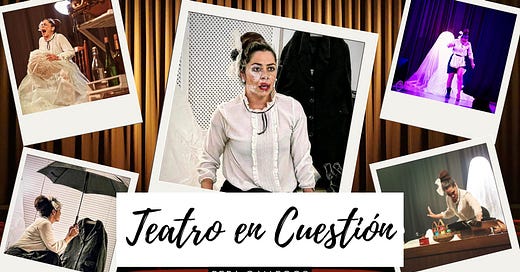Therapeutic theater: a tool to change stereotypes and reflect on society
Pepa Gallegos, director of the Teatro en Cuestión project, brings social theater to various groups in the province of Málaga.
Theatre can be so much more than just a performance on stage. For Pepa Gallegos, founder of Teatro en Cuestión, therapeutic theatre is a powerful tool for both social and personal reflection, capable of shattering stereotypes and helping young people and adults alike understand their emotions and inner conflicts.
Pepa, as she likes to be called, gave us the chance to get to know the person behind this initiative and learn how her passion for helping others through theater was born.
Since its creation in 2017, Teatro en Cuestión has focused on using participatory theater as a therapeutic tool. Its approach, which has gained ground in both schools and adult groups, seeks to transform social and personal conflicts through interactive performances where the audience becomes an active part of the show.
In a recent interview with Estepona Info, Gallegos explained how her project began as a combination of her passion for theater and her background in social intervention. Throughout the conversation, she also shared her experiences working with adolescents and adults, and how theater becomes a bridge to address complex topics such as gender equality and gender-based violence.
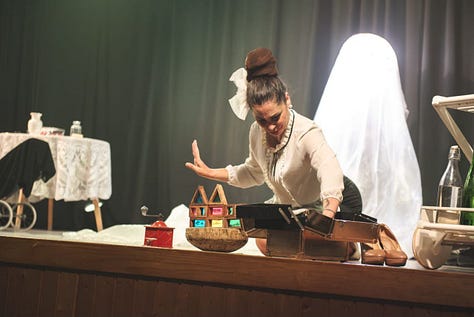
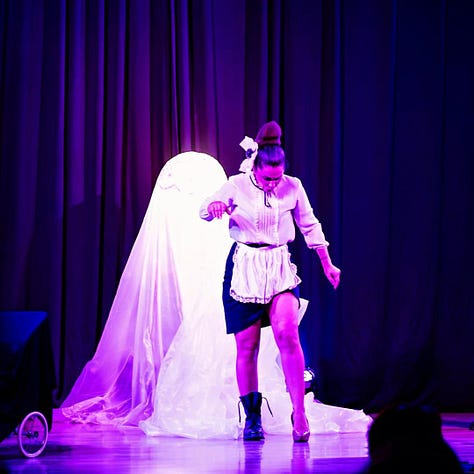
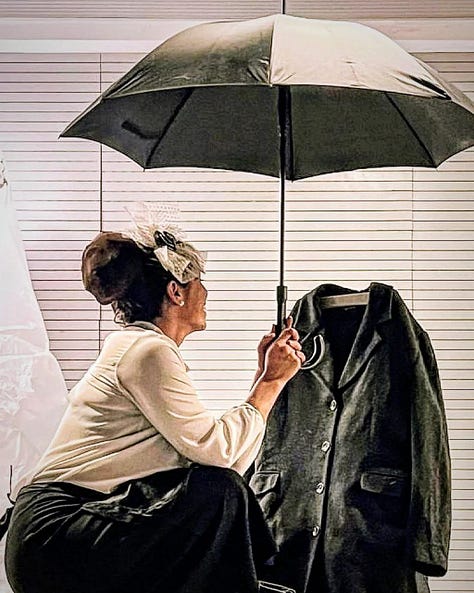

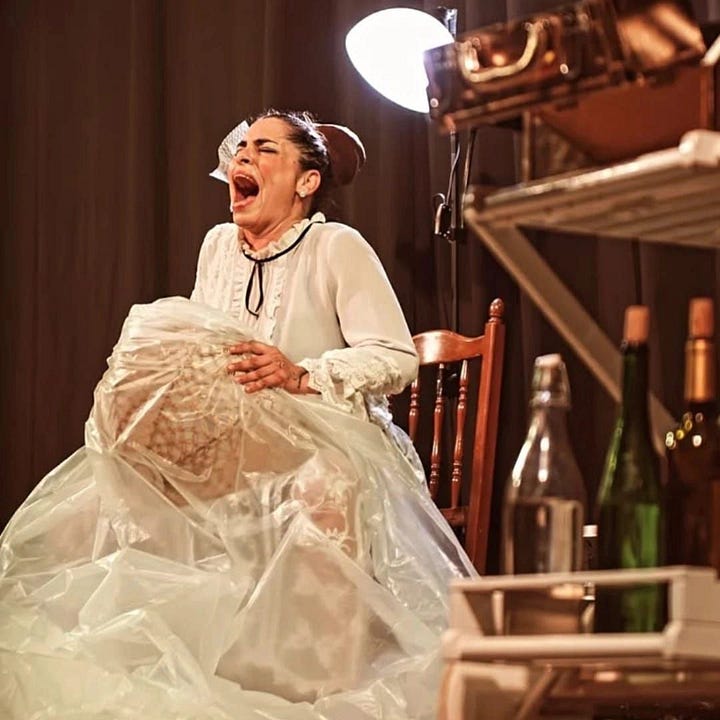
How did the Teatro en Cuestión project get started?
Pepa Gallegos: Teatro en Cuestión began in 2017. It came about as a way to combine two of my biggest passions: theatre and social intervention. My background in social integration and dramatic arts allowed me to merge these fields and start working on projects that were not only cultural but also had a social impact. After my experience with the Trasto Teatro company, I decided to strike out on my own and create this project, where theatre becomes a vehicle for addressing social and personal conflicts.
What type of theatre do you use at Teatro en Cuestión?
Pepa Gallegos: I mainly use Forum Theatre, which is a tool from the Theatre of the Oppressed, created by Augusto Boal. It's a type of participatory theatre where the audience doesn't just watch the play, but has the chance to intervene directly in the conflict being presented. We ask them to propose alternatives to the situations shown, which allows the conflict to be transformed in real time. This approach makes the audience feel like an active part of the play, reflecting on and proposing solutions to the problems the characters face.
What topics does Teatro en Cuestión primarily focus on?
Pepa Gallegos: One of Teatro en Cuestión's central themes is gender equality. I started working in this area with the piece *Acompaña*, which addresses work-life balance and shared responsibility. Theatre becomes a tool for reflecting on issues like gender roles, inequalities in the home, and how we can transform them. We also run workshops that allow young people and adults to express their thoughts and experiences on these topics through theatre.
What kind of impact do you think theater has on teenagers, especially concerning the issues you mention, like gender inequality?
Pepa Gallegos: With teenagers, one of the biggest challenges is how sexist attitudes, bullying, and violence are being perpetuated through social media and in their immediate circles. In my workshops and performances, I've noticed a worrying increase in hate speech, particularly among boys, who defend very traditional views on the role of women. Theater has a profound impact because it allows them to reflect on these attitudes from a different angle, showing them the consequences of such behavior in a more participatory and emotional setting. What interests me is that, through theatrical action, they can experience what it means to act one way or another, and how those decisions affect their environment.
In your experience, how has the way teenagers approach these topics changed in recent years?
Pepa Gallegos: I've noticed a very sharp change in discourse over the last two years. Before, young people would listen to discussions and were more receptive to ideas reflecting on equality, but now there are more dissenting voices with very sexist views, claiming that feminism has gone too far. Essentially, they now dare to express much harsher opinions, like comments rejecting gender equality or even justifying violent behavior. The fact that these views are fueled by social media, where they quickly go viral, has a huge impact on how they see relationships, power, and violence. What I aim for with theater is to shift that perspective, helping them question what they're learning and giving them a space to reconsider those ideas.
Theater seems to be a very powerful tool for social reflection. How do you combine this approach with your background in psychology?
Pepa Gallegos: Theater was my initial driving force, but over time I realized I also needed psychological tools to better understand the people I worked with. I trained as a Gestalt therapist because I felt I could use theater not just as an artistic tool, but also as a way to delve deep into the participants' emotional conflicts. This training allowed me to integrate a more therapeutic approach into my workshops, where the goal isn't just performance, but also supporting people through their journey of self-discovery and personal transformation.
Is therapeutic theatre a viable option for those without prior experience on stage or in therapy?
Pepa Gallegos: Absolutely. Actually, most of the people I work with have no background in either theatre or therapy. What I offer them is a space where they can explore their creativity and express what's inside them, without the pressure of having to be «actors». The important thing is for them to allow themselves to experiment, play, and break free from those mental blocks that tell us we can't do something just because we aren't experts. I've worked with people up to 70 years old who had never set foot on a stage before, yet in their very first session, they found the courage to perform a monologue about their lives. Ultimately, theatre is simply a way to let our truth emerge, free from judgment or expectation.
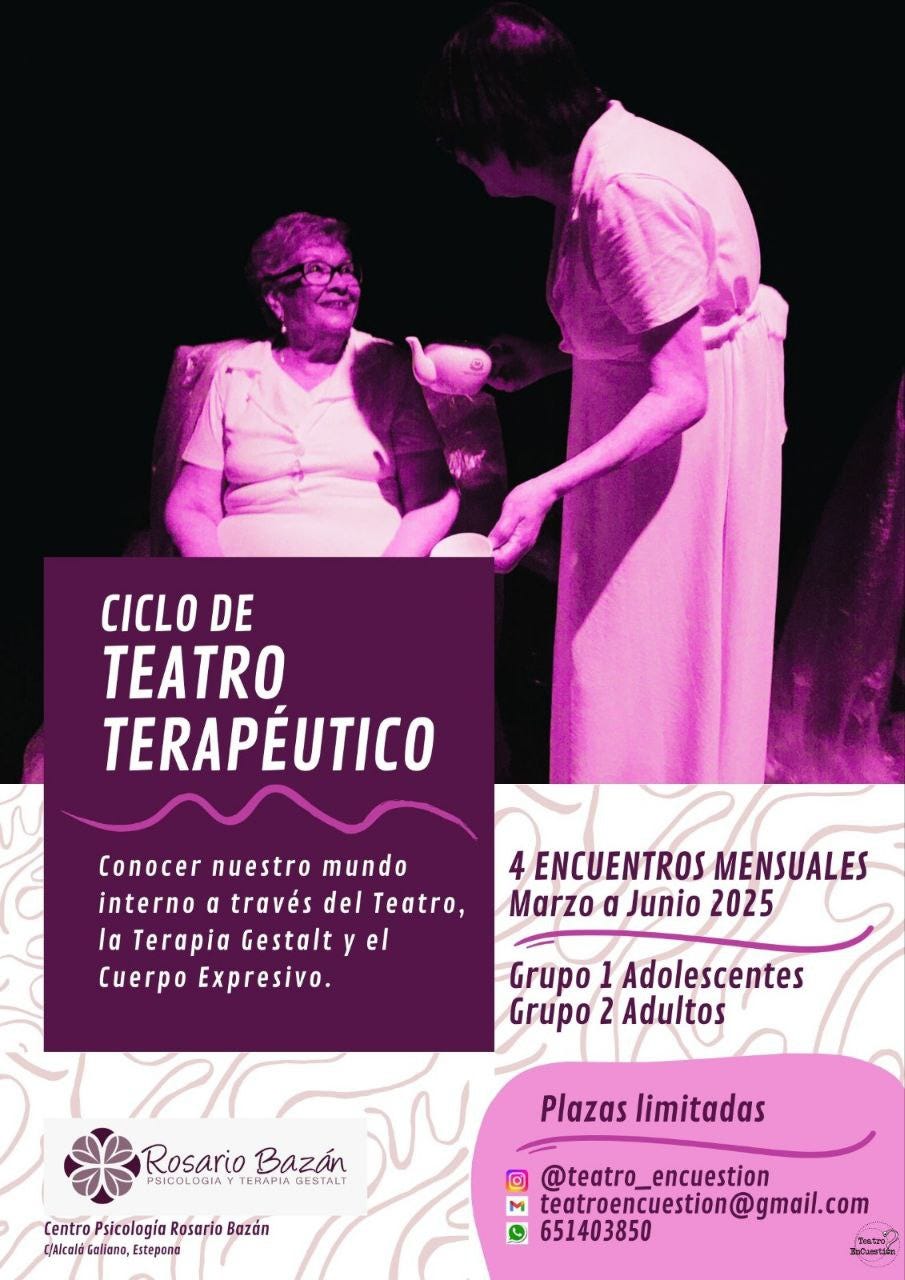
Besides the workshops and plays you offer, how can interested people get in touch to participate or hire your services?
Pepa Gallegos: Right now, I have two main plays: *Acompaña*, which deals with balancing family life, and *Ella*, which follows a woman's life journey as she faces challenges from society and her own environment. Both plays are available for booking. I also offer workshops for both young people and adults, covering topics like gender equality, bullying, conflict resolution, and therapeutic processes. Those interested can contact me via my website, encuestionsocial.com, or through the Teatro en Cuestión social media pages on Instagram and Facebook. They can also email me at teatroencuestion@gmail.com or call me directly. I'm available to work with both public and private institutions, including educational centers, personal growth spaces, and more.
What final message would you give to those who have doubts about participating in a therapeutic theater workshop?
Pepa Gallegos: I would tell them not to be afraid to try. Theater isn’t just for actors or actresses; it’s for people who want to get to know themselves better, explore their emotions, and share them in a creative way. Age or experience doesn’t matter; what’s important is being willing to open up and participate. Sometimes, all it takes is a little push to discover a part of ourselves that was hidden. And above all, remember that theater, in the end, is a reflection of life itself.
Estepona Info thanks Pepa Gallegos for her time and for sharing her perspective on therapeutic theater with us. For more information about her projects, don’t hesitate to follow Teatro en Cuestión’s social media and get in touch through the mentioned channels.

